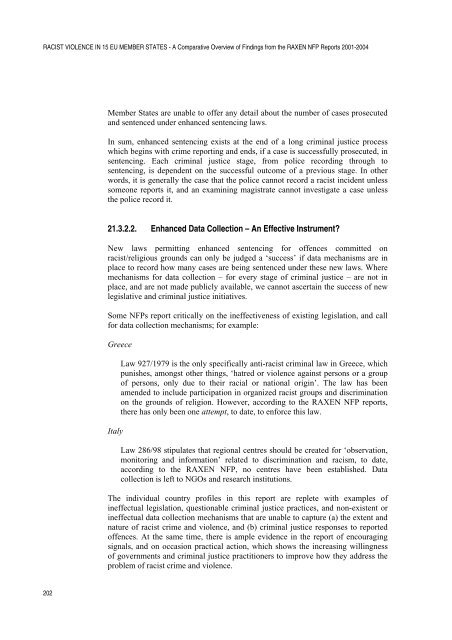RACIST VIOLENCE IN 15 EU MEMBER STATES - Cospe
RACIST VIOLENCE IN 15 EU MEMBER STATES - Cospe
RACIST VIOLENCE IN 15 EU MEMBER STATES - Cospe
Create successful ePaper yourself
Turn your PDF publications into a flip-book with our unique Google optimized e-Paper software.
<strong>RACIST</strong> <strong>VIOLENCE</strong> <strong>IN</strong> <strong>15</strong> <strong>EU</strong> <strong>MEMBER</strong> <strong>STATES</strong> - A Comparative Overview of Findings from the RAXEN NFP Reports 2001-2004<br />
Member States are unable to offer any detail about the number of cases prosecuted<br />
and sentenced under enhanced sentencing laws.<br />
In sum, enhanced sentencing exists at the end of a long criminal justice process<br />
which begins with crime reporting and ends, if a case is successfully prosecuted, in<br />
sentencing. Each criminal justice stage, from police recording through to<br />
sentencing, is dependent on the successful outcome of a previous stage. In other<br />
words, it is generally the case that the police cannot record a racist incident unless<br />
someone reports it, and an examining magistrate cannot investigate a case unless<br />
the police record it.<br />
21.3.2.2. Enhanced Data Collection – An Effective Instrument?<br />
New laws permitting enhanced sentencing for offences committed on<br />
racist/religious grounds can only be judged a ‘success’ if data mechanisms are in<br />
place to record how many cases are being sentenced under these new laws. Where<br />
mechanisms for data collection – for every stage of criminal justice – are not in<br />
place, and are not made publicly available, we cannot ascertain the success of new<br />
legislative and criminal justice initiatives.<br />
Some NFPs report critically on the ineffectiveness of existing legislation, and call<br />
for data collection mechanisms; for example:<br />
Greece<br />
Italy<br />
Law 927/1979 is the only specifically anti-racist criminal law in Greece, which<br />
punishes, amongst other things, ‘hatred or violence against persons or a group<br />
of persons, only due to their racial or national origin’. The law has been<br />
amended to include participation in organized racist groups and discrimination<br />
on the grounds of religion. However, according to the RAXEN NFP reports,<br />
there has only been one attempt, to date, to enforce this law.<br />
Law 286/98 stipulates that regional centres should be created for ‘observation,<br />
monitoring and information’ related to discrimination and racism, to date,<br />
according to the RAXEN NFP, no centres have been established. Data<br />
collection is left to NGOs and research institutions.<br />
The individual country profiles in this report are replete with examples of<br />
ineffectual legislation, questionable criminal justice practices, and non-existent or<br />
ineffectual data collection mechanisms that are unable to capture (a) the extent and<br />
nature of racist crime and violence, and (b) criminal justice responses to reported<br />
offences. At the same time, there is ample evidence in the report of encouraging<br />
signals, and on occasion practical action, which shows the increasing willingness<br />
of governments and criminal justice practitioners to improve how they address the<br />
problem of racist crime and violence.<br />
202
















